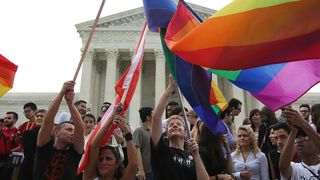The United States Studies Centre commissioned surveys with YouGov PLC to compare public opinion on same-sex marriage in the United States and Australia.
Key findings
- Sixty per cent of Australians support same-sex marriage (SSM), 32 per cent oppose and 8 per cent are undecided.
- Despite SSM having been legal in some states for many years, and across the country since 2015, support for same-sex marriage is 12 points lower in the United States than Australia. Forty-eight per cent of Americans support same-sex marriage, 40 per cent oppose and 12 per cent are undecided.
- SSM is a much more polarising issue in the United States than in Australia. Democrats and Republicans differ markedly in their attitudes towards SSM, being much further apart on this issue than are supporters of Labor and Coalition. Seventy-four per cent of Democrats approve of SSM, compared to just 24 per cent of Republicans, a difference of 50 points. Sixty-eight per cent of Labor supporters and 51 per cent of Coalition supporters approve of SSM, a difference of 17 points, or one-third the partisan differential in the United States.
- SSM remains a contentious issue in the United States, even two years after the Supreme Court’s June 2015 ruling that state-level bans on SSM were unconstitutional and four years after the Supreme Court ruled that federal restrictions on SSM were unconstitutional.
- The ongoing conflict over SSM in the United States highlights two key differences in the politics and law around SSM between the two countries, with some lessons for Australia:
1. At least until recently, the American states have had the power to regulate SSM. In Australia, the regulation of marriage is a matter for the Commonwealth.
2. An array of ballot initiatives, state and federal legislation sought to regulate SSM in the United States, with the Supreme Court decisions settling the matter (at least formally).
The absence of a relatively clear and direct expression of national, public opinion on SSM in the United States — and the reliance on the courts to provide some measure of legal clarity — may well speak to why the issue remains controversial in the United States and the fate of the SSM question here in Australia. - Presenting arguments for and against SSM appear to have very little impact on whether respondents support SSM. A question-wording experiment presented respondents with arguments for SSM (”equality”) and against SSM (raising concerns about impinging on religious freedom) before asking respondents about SSM. Providing arguments in favour and opposed to SSM has no discernible impact on attitudes towards SSM in either the United States or Australia. Both arguments seem to carry equal force, cancelling each other out.
- Americans are also more likely to support the right of business owners with religious objections to same-sex marriage to refuse to provide services to a same-sex marriage ceremony, with 50 per cent of Americans agreeing to this statement, 35 per cent disagreeing and 15 per cent not taking a position. In Australia, 43 per cent of respondents agreed business owners should have a right to refuse to provide services to a same-sex wedding, 39 per cent disagreed and 17 per cent did not take a position.
- This second issue is also more partisan in America than Australia.
Approval of same-sex marriage
Respondents in both Australia and the United States were asked:
Do you approve or not approve of same-sex couples being allowed to marry?
Table 1 presents the results from the USSC-YouGov poll, showing the rate at which respondents approve of SSM in either country by the party they voted for in the most recent national election of each country (2016 House of Representatives vote in Australia, and 2016 presidential in the United States).
Table 1: Support for same-sex marriage by vote
| Australia | United States | |||
|---|---|---|---|---|
| 2016 vote | Support (%) | 2016 vote | Support (%) | |
| Coalition | 51 | Republican | 24 | |
| Other | 54 | Other | 46 | |
| Labor | 68 | Democrat | 74 | |
| Greens | 87 | |||
| Total | 60 | Total | 48 | |
Even this simple tabulation makes clear the different nature of the politics of SSM in either country. Despite same-sex marriage having been legal in some states for many years, and across the country since 2015, just 24 per cent of Republicans support same-sex marriage while the figure is 74 per cent for Democrats.
This is not the case in Australia, with the data indicating a virtually even split of opinion on same-sex marriage among Coalition voters. This suggests that same-sex marriage is an "easier" issue for Labor, in the sense that its voters display less disagreement on the issue, with 68 per cent supporting same-sex marriage.
Tables 2 and 3 present support for same-sex marriage by religion and age. In both the United States and Australia, support for same-sex marriage is highest among the non-religious, and the young. While partisan affiliation matters more in America and religion is significant in both, age is more important in Australia; with slightly less than half of voters over 55 supportive of same-sex marriage compared with approximately 73 per cent of those between 18 and 34.
Table 2: Support for same-sex marriage by religion
| Australia | United States | |||
|---|---|---|---|---|
| Religion | Support (%) | Religion | Support (%) | |
| Christian | 48 | Christian | 36 | |
| Other | 65 | Other | 42 | |
| None | 74 | None | 69 | |
| Total | 60 | Total | 48 | |
Table 3: Support for same-sex marriage by age
| Australia | United States | |||
|---|---|---|---|---|
| Age | Support (%) | Age | Support (%) | |
| 55 and over | 46 | 55 and over | 37 | |
| 35 to 54 | 64 | 35 to 54 | 51 | |
| 18 to 34 | 73 | 18 to 34 | 59 | |
| Total | 60 | Total | 48 | |
Equality versus religious freedom
Two broad arguments about SSM have been prominents in discussion in both the United States and Australia. Supporters of SSM couch the issue as one of equality, rights and equal treatment under the law. Opponents argue that SSM impinges on the religious freedoms of those whose religious convictions prohibit SSM.
So as to mimic exposure to these claims we embedded a question-wording experiment in our survey. When asking about SSM, respondents were randomly assigned to receive either the ”plain” version of the proposition:
Do you approve or not approve of same-sex couples being allowed to marry?
or a version summarising the ”equality” and ”religious freedom” arguments for and against SSM:
Some people believe that permitting same-sex marriage would promote equality in <Australia/America>. Other people believe same-sex marriage is a threat to religious freedom. For instance, bakers may be required to make wedding cakes for same-sex marriages, and schools may be required to teach about same-sex relationships. Do you approve or not approve of same-sex couples being allowed to marry?
Shown in Table 4, the results of this question wording experiment indicate that these common arguments for and against SSM appear to have very little impact on respondents’ expressed support for same-sex marriage. This indicates that both arguments carry equal force, cancelling each other out.
Table 4: Effect of campaign treatment on same-sex marriage
| Australia | United States | |||
|---|---|---|---|---|
| Treatment group | Support (%) | Treatment group | Support (%) | |
| Control | 60 | Control | 46 | |
| Treatment | 61 | Treatment | 49 | |
Religious freedom, the next fight?
If a majority of voters indicate in the survey currently being counted by the Australian Bureau of Statistics that they support a change to the Marriage Act, the next area of political conflict concerning same-sex marriage in Australia may be over the overlapping rights of same-sex couples to be married, and for those objecting on religious grounds to be free not to provide services for these wedding ceremonies. This is currently being debated in the United States, with a case before the Supreme Court over the right of businesses to refuse to provide services to a same-sex marriage ceremony. Amendments for these rights of exemption have also been proposed to same-sex marriage legislation in Australia.
To understand public opinion on this issue, we asked the question:
Should business owners with religious objections to same-sex marriage have the right to refuse to provide services to a same-sex marriage ceremony?
Our results are shown in Tables 5-7.
Table 5: Support for right to refuse by 2016 vote
| Australia | United States | |||
|---|---|---|---|---|
| 2016 vote | Support (%) | 2016 vote | Support (%) | |
| Greens | 33 | Democrat | 30 | |
| Labor | 33 | Other | 42 | |
| Coalition | 49 | Republican | 85 | |
| Other | 52 | |||
| Total | 43 | Total | 50 | |
Table 6: Support for right to refuse by religion
| Australia | United States | |||
|---|---|---|---|---|
| Religion | Support (%) | Religion | Support (%) | |
| None | 34 | None | 36 | |
| Other | 44 | Other | 44 | |
| Christian | 55 | Christian | 60 | |
| Total | 43 | Total | 50 | |
Table 7: Support for right to refuse by age
| Australia | United States | |||
|---|---|---|---|---|
| Age | Support (%) | Age | Support (%) | |
| 18 to 34 | 42 | 18 to 34 | 40 | |
| 35 to 54 | 46 | 35 to 54 | 45 | |
| 55 and over | 41 | 55 and over | 61 | |
| Total | 43 | Total | 50 | |
We find that overall Americans are more likely than Australians to support the right of business owners with religious objections to same-sex marriage to refuse to provide services to a same-sex marriage ceremony. Equal numbers of Americans agree and disagree whether business should be able to refuse their services. In Australia, 43 per cent of respondents agree business owners should have a right to refuse to provide services to a same-sex wedding.
This may indicate that US respondents are more protective of the rights of religiously inclined to ”opt out”, and that arguments founded in ”protections against tyranny of the majority” (in this case, protecting the rights of a large minority of religious voters opposed to same-sex marriage) are slightly more effective in the United States than they are in Australia.
As with overall support for same-sex marriage, this issue is more partisan in the United States than it is in Australia. In the United States, 85 per cent of Republicans agree compared with 30 per cent of Democrats. In Australia, 49 per cent of Coalition voters support the right to refuse compared with 33 per cent of Labor voters.
In both countries, support for religious exemptions was highest among Christians. In the United States, there was also a strong age difference, with young voters much less likely to support than those over 55. However, in Australia there was little difference between younger and older voters.
Detailed tables
Table 8: Percentage approving of same-sex marriage, by selected attributes
| Australia | United States | |
|---|---|---|
| Gender | ||
| Female | 63 | 52 |
| Male | 58 | 44 |
| Age | ||
| 18 to 34 | 73 | 59 |
| 35 to 54 | 64 | 51 |
| 55 and over | 46 | 37 |
| Religion | ||
| Christian | 48 | 36 |
| Other | 65 | 42 |
| None | 74 | 69 |
| Education | ||
| Some school | 37 | 35 |
| High school | 68 | 40 |
| Some tertiary | 65 | 51 |
| University | 67 | 57 |
| Income | ||
| High | 66 | 59 |
| Middle | 62 | 48 |
| Low | 55 | 37 |
| House of Representatives vote, 2016 (Aus) | ||
| Coalition | 51 | |
| Greens | 87 | |
| Labor | 68 | |
| Other | 54 | |
| Presidential vote, 2016 (US) | ||
| Democrat | 74 | |
| Other | 46 | |
| Republican | 24 | |
| Race (US) | ||
| Black | 43 | |
| Hispanic | 47 | |
| Other | 53 | |
| White | 48 | |
Table 9: Percentage approving of businesses having the right to refuse to participate in SSM, by selected attributes
| Australia | United States | |
|---|---|---|
| Approve/disapprove SSM | ||
| Approve | 36 | 31 |
| Disapprove | 54 | 67 |
| Gender | ||
| Female | 37 | 45 |
| Male | 50 | 55 |
| Age | ||
| 18 to 34 | 42 | 40 |
| 35 to 54 | 46 | 45 |
| 55 and over | 41 | 61 |
| Religion | ||
| Christian | 55 | 60 |
| Other | 44 | 44 |
| None | 34 | 36 |
| Education | ||
| Some school | 41 | 49 |
| High school | 36 | 46 |
| Some tertiary | 40 | 51 |
| University | 55 | 53 |
| Income | ||
| High | 43 | 50 |
| Middle | 55 | 50 |
| Low | 36 | 46 |
| House of Representatives vote, 2016 (Aus) | ||
| Coalition | 49 | |
| Greens | 33 | |
| Labor | 33 | |
| Other | 52 | |
| Presidential vote, 2016 (US) | ||
| Democrat | 30 | |
| Other | 42 | |
| Republican | 85 | |
| Race (US) | ||
| Black | 41 | |
| Hispanic | 43 | |
| Other | 44 | |
| White | 53 | |
Table 10: Too much, too little or right amount of respect for religion in [Australia|America], by selected attributes
| Australia | United States | ||||||
|---|---|---|---|---|---|---|---|
| Too little | Right amount | Too much | Too little | Right amount | Too much | ||
| Approve/disapprove SSM | |||||||
| Approve | 29 | 34 | 37 | 29 | 32 | 38 | |
| Disapprove | 53 | 28 | 18 | 71 | 21 | 8 | |
| Gender | |||||||
| Female | 42 | 30 | 28 | 54 | 27 | 19 | |
| Male | 34 | 34 | 33 | 48 | 26 | 26 | |
| Age | |||||||
| 18 to 34 | 30 | 37 | 33 | 34 | 37 | 29 | |
| 35 to 54 | 35 | 32 | 32 | 50 | 25 | 25 | |
| 55 and over | 44 | 31 | 25 | 66 | 20 | 15 | |
| Religion | |||||||
| Christian | 58 | 30 | 12 | 67 | 24 | 9 | |
| Other | 38 | 46 | 16 | 26 | 31 | 44 | |
| None | 18 | 30 | 52 | 53 | 23 | 24 | |
| Education | |||||||
| Some school | 47 | 28 | 24 | 55 | 32 | 13 | |
| High school | 29 | 33 | 39 | 54 | 28 | 18 | |
| Some tertiary | 37 | 32 | 31 | 51 | 25 | 24 | |
| University | 41 | 34 | 26 | 48 | 24 | 28 | |
| Income | |||||||
| High | 34 | 31 | 35 | 45 | 24 | 32 | |
| Middle | 39 | 37 | 25 | 55 | 26 | 19 | |
| Low | 43 | 28 | 29 | 55 | 31 | 14 | |
| House of Representatives vote, 2016 (Aus) | |||||||
| Coalition | 45 | 35 | 20 | ||||
| Greens | 20 | 16 | 64 | ||||
| Labor | 28 | 35 | 37 | ||||
| Other | 47 | 29 | 24 | ||||
| Presidential vote, 2016 (US) | |||||||
| Democrat | 29 | 33 | 38 | ||||
| Other | 48 | 28 | 24 | ||||
| Republican | 80 | 16 | 3 | ||||
| Race (US) | |||||||
| Black | 52 | 31 | 17 | ||||
| Hispanic | 54 | 31 | 16 | ||||
| Other | 27 | 40 | 33 | ||||
| White | 54 | 23 | 23 | ||||
Table 11: Too much, too little or right amount of freedom of religion in [Australia|America], by selected attributes
| Australia | United States | ||||||
|---|---|---|---|---|---|---|---|
| Too little | Right amount | Too much | Too little | Right amount | Too much | ||
| Approve/disapprove SSM | |||||||
| Approve | 17 | 72 | 11 | 18 | 73 | 9 | |
| Disapprove | 12 | 73 | 16 | 33 | 58 | 9 | |
| Gender | |||||||
| Female | 15 | 72 | 13 | 27 | 66 | 7 | |
| Male | 15 | 72 | 12 | 24 | 64 | 12 | |
| Age | |||||||
| 18 to 34 | 22 | 64 | 14 | 26 | 61 | 13 | |
| 35 to 54 | 16 | 69 | 15 | 25 | 63 | 13 | |
| 55 and over | 6 | 82 | 12 | 26 | 70 | 4 | |
| Religion | |||||||
| Christian | 12 | 75 | 12 | 27 | 67 | 7 | |
| Other | 25 | 57 | 18 | 24 | 64 | 12 | |
| None | 14 | 76 | 10 | 26 | 61 | 13 | |
| Education | |||||||
| Some school | 11 | 77 | 12 | 32 | 56 | 12 | |
| High school | 17 | 68 | 14 | 28 | 64 | 8 | |
| Some tertiary | 11 | 76 | 13 | 27 | 62 | 11 | |
| University | 20 | 69 | 11 | 20 | 72 | 8 | |
| Income | |||||||
| High | 18 | 71 | 11 | 20 | 68 | 12 | |
| Middle | 19 | 69 | 12 | 23 | 70 | 7 | |
| Low | 10 | 74 | 16 | 34 | 54 | 12 | |
| House of Representatives vote, 2016 (Aus) | |||||||
| Coalition | 15 | 71 | 13 | ||||
| Greens | 12 | 73 | 15 | ||||
| Labor | 11 | 76 | 13 | ||||
| Other | 22 | 68 | 10 | ||||
| Presidential vote, 2016 (US) | |||||||
| Democrat | 15 | 77 | 8 | ||||
| Other | 27 | 63 | 10 | ||||
| Republican | 33 | 58 | 9 | ||||
| Race (US) | |||||||
| Black | 35 | 60 | 5 | ||||
| Hispanic | 22 | 64 | 14 | ||||
| Other | 36 | 52 | 11 | ||||
| White | 23 | 68 | 9 | ||||
Methodology
The United States Studies Centre and YouGov surveyed more than 1,000 respondents in each country in late October 2017 — 1009 in Australia and 1107 in the United States. These respondents were recruited from YouGov’s online panel. Responses were weighted by YouGov to ensure a sample representive of the Australian and American populations. The Australian sample was weighted by age, gender, education, region (crossed with city, non-city) and past vote. The US sample was weighted by age, gender, race, education, region, voter registration, 2012 presidential vote and 2016 presidential vote.
The margin of error for the entire sample of each country is approximately 3 per cent, with higher margins for population breakdowns.
Background to the USSC-YouGov poll
In September 2017, the United States Studies Centre announced that it had partnered with global survey company YouGov, which now provides the Centre with exclusive, monthly polling data from the United States and Australia; tracking not just perceptions of political leadership in both countries, but also unique, targeted insights on a diverse range of topics.
CEO of the United States Studies Centre Professor Simon Jackman, a leader in public opinion research, has previously worked as one of the principal investigators of the American National Election Studies and partnered with media outlets including the Guardian Australia and the Huffington Post on pre-election polling. He said the results provided by YouGov as part of the new partnership will allow the Centre to analyse and publish unprecedented comparative data.
"The United States Studies Centre has taken a keen interest in the attitudes and opinions of people in our region, with research like our surveys into America’s role in the Indo-Pacific. This exciting new partnership with YouGov gives us the opportunity to broaden that focus to public opinion in the United States and then contrast that with the views of people in our own backyard," Jackman said.
"The Centre has a mandate to deepen Australia’s understanding of America. This ongoing commitment to charting public perceptions in both countries is an ideal way for Australians to gain perspective on the United States."
YouGov is a market research and opinion polling company headquartered in the United Kingdom, with operations in Europe, North America, the Middle East and the Asia-Pacific.








